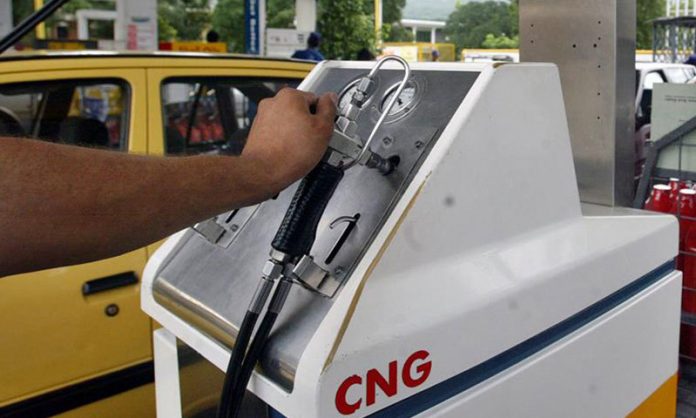The Compressed Natural Gas (CNG) industry can reduce the rising circular debt by Rs1,500 billion per annum only if it is supplied the required quantity of gas and provided a level playing field to run the business.
This was stated by Ghiyas Abdullah Paracha, a senior leader of the All Pakistan CNG Association, on Tuesday saying, CNG sector can be helpful in decreasing the mushrooming menace of the circular debt by Rs1,500 billion per annum only if the industry (CNG) is supplied the needed gas and provided a level playing field by the government to run the business.
He said that currently the CNG sector is getting the gas from the government at an expensive price ranging between $13 per Million British Thermal Unit (MMBTU) to $20 per MMBTU while the government is supplying the gas to all other sectors at the rate ranging between $3 per MMBTU to $8 per MMBTU. He said the government must immediately take policy decision regarding restoration of the gas supply to the CNG sector in order to save the national exchequer from the additional burden of ever-increasing circular debt that had crossed Rs2 trillion in the energy sector and also to save the skin of already burdened public from the mounting oil prices in global oil market, which is causing colossal additional burden on public after every fifteen days.
The government is supplying gas to those sectors which are also getting heavy subsidies while the CNG sector is deprived of gas supply despite the fact that this sector has been not taking a single penny as subsidy to run its businesses , said Ghiyas Abdullah Paracha.
Requesting the government to restore the gas supply to CNG sector, Paracha asked to immediately open the CNG stations of Punjab which are facing closure from last seven months in a bid to save the public from the impact of rising oil prices in the international oil market. He said that the government can save $2.1 billion per annum of the foreign remittance through the import bill if it facilitates the private sector in liquefied natural gas (LNG) import while a 50% reduction in public transport fares is also possible only if the government restores local gas supply to the CNG sector. He said revival of the CNG sector can generate thousands of new employment/job opportunities while the use of CNG as an alternate fuel for motor vehicles is equivalent to having an environmental benefit of 152.63 million trees per annum. The CNG is still cheaper than prevailing petrol price while its price will be cheaper than petrol if the private sector is allowed to import LNG for the CNG sector of the country, said Ghiyas Abdullah Paracha.
He added that ironically, expansive Re-gasified Liquefied Natural Gas (RLNG) is supplied to those sectors which are getting the subsidy and they are not paying the price of RLNG in time while CNG sector is ready to pay full price of gas in time but it (CNG sector) is denied to obtain RLNG to run their businesses which were established with the hard earned investment of approximately Rs350 billion.
It is pertinent to mention that total 2300 CNG Stations are established in the country and out of which 1100 CNG Stations are located in Punjab, 600 CNG Stations are situated in Sindh, 575 CNG Stations CNG Stations are operating in Khyber Pakhtunkhwa and 25 CNG Stations are have been established in Balochistan province. At present, approximately 50pc of the total CNG Stations of Punjab Province have suspended their operation due to non-availability of gas. Similarly, Rs150 billion worth local investment so far made in developing the CNG kits has been facing serious danger due to closure of CNG Stations and non-availability of gas as a fuel for motor vehicles. Furthermore, direct and indirect employment in the CNG sector is 5.1 lakh.

























Nice Post.Thanks for sharing the post
Thanks for sharing the post!
counts usplz
03005188423
thank you for sharing
Thankyou For Sharing